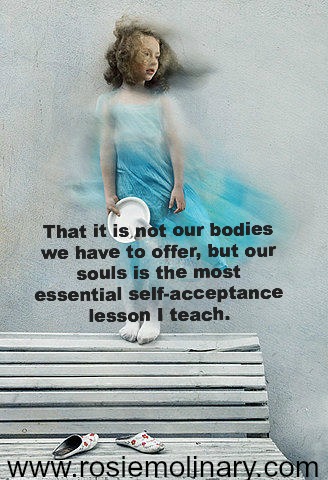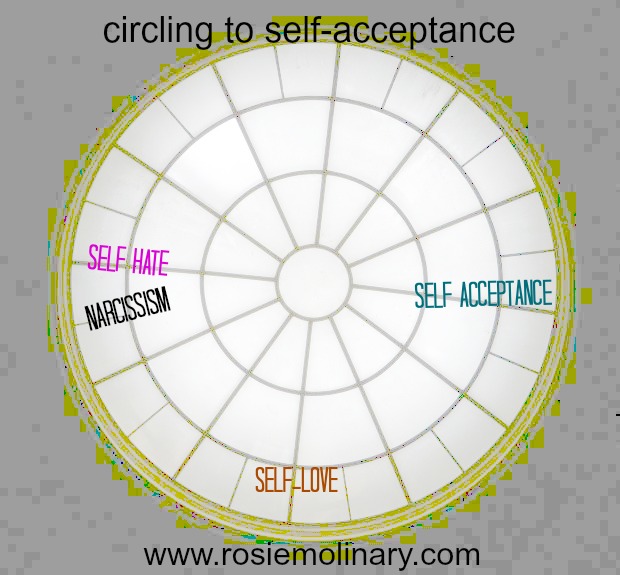“What is self-acceptance?” I often ask towards the beginning of my 10 Truths for Your Self-Acceptance Journey talk.
“Self-love!” People often shout back.
And while self-love might be one’s expression of her self-acceptance, I think of self-acceptance as a little different from self-love.
Imagine a line: a continuum from self-hate to self-love, if you will. With self-hate being the furthest point to the left and self-love being the furthest point to the right (for this example). I like to think of self-acceptance as neatly residing between them—a position of neutrality about the self—a place where one understands that she has worth and power and dignity simply because she exists.
For some people, the concept of self-love is terribly uncomfortable for a litany of reasons: upbringing, faith, temperament, ideas around language, etc. What they imagine it to be makes them self-conscious. So having self-love be the ideal destination feels too inauthentic (to themselves) and, thus, they avoid it, choosing over and over again a relationship with the self that looks like the opposite of self-love, lest anyone think they are self-impressed or arrogant or anything else.
“I don’t want to be a narcissist,” people have said to me.
But I would argue that narcissism is not the polar opposite of self-hate but just a reinterpretation of it. Now, imagine the continuum of how we feel about ourselves is no longer a line but a circle. If self-hate is just north of due west on a compass, then narcissism, I believe, is just south of due west. Narcissism is the result of someone trying to reconcile her self-hate but using the wrong tools and truths to get herself there. We might think that what she has is self-love run amok but what she actually has is the other side of the self-hate coin.
Let me be clear that I do not think that practicing and embracing self-love is being self-impressed or arrogant. But I do understand that sometimes semantics can keep us away from a practice that might be good for us and so I yearn for a way to make a positive, healthy relationship with the self accessible to everyone so that we all might be able to embrace a healthier way of relating to ourselves. Given that, I focus my energy on encouraging self-acceptance.
Imagine self-acceptance as operating from a position of neutrality. Those who practice self-acceptance understand that their worth is not earned. They are not bad or ruined, they are not perfect or faultless. They are not fundamentally wrong because of their history or talents or physical body. In fact, they are fundamentally right because they exist, because they, just like every other person, was put here on purpose. Ultimately, they chose to recognize their humanity just as they recognize and respect the humanity of others. They live in honor of the whole self. Difficult experiences aren’t mistakes or screw ups, they are just information that provide an opportunity for growth.
Once, after the local newspaper covered all natural day in my class, a reader sent a letter to the editor to protest that such a class was being taught and funded by tax dollars. We’re creating narcissistic young people who have no marketable skills with dumb classes like this, the writer basically said.
I’ve had a varied career, doing work that I felt really mattered, and this body image work is some of the most important work I’ve ever done. But it is not important because my students can look in the mirror at the end of the semester and like what they see. Contrary to what some might believe, the accomplishment at the end of the semester isn’t that a smattering of young people get such inflated egos from feeling so much better about themselves that they lose all perspective. The real accomplishment at the end of the semester is that my students leave the class no longer paralyzed about how they feel about themselves, with a sense of empowerment about what they have to offer, and with an invigorated perspective so that they can go out and do work that they feel really matters to them and the world. That it is not our bodies that we have to offer, but our souls (yet, treating our bodies in a way that allows us to live our mission is imperative) is the most essential self-acceptance lesson I teach.
I believe that we are here on purpose. That we are each part of a solution that this world needs. If we are consumed by our bodies, then we are taking valuable time away from the work we are meant to be doing in this world and the gifts we are meant to be giving to this world, from our purpose.
Yes, I think every one of us has not just the right but the responsibility to respect the vessel that carries us through life. Yes, I think that other people’s standards- whether we are talking about our mom or the media- should not factor into our awareness of our worth. Yes, I think that how we see ourselves fundamentally needs to change. But I do not think these things because what we see in the mirror is important. I think these things because too much else is important and we have over-prioritized our reflection.
What if nothing you did was fundamentally bad? That doesn’t mean there is nothing to learn from or no room for growth, just that you do not deserve berating for things turning out differently than what you had hoped. You deserve to pay attention and to gather the information that will help you grow. What if you could look at the things that turn out the way you had hoped with a sense of satisfaction and an eye towards what growth they, too, offer you? Self-acceptance is waiting for you.




